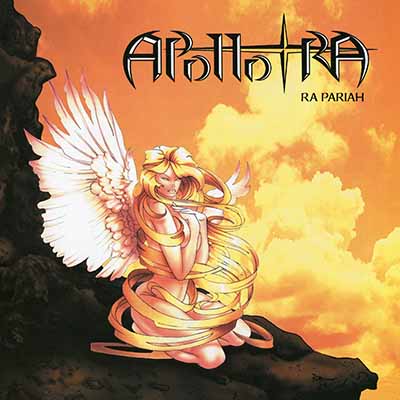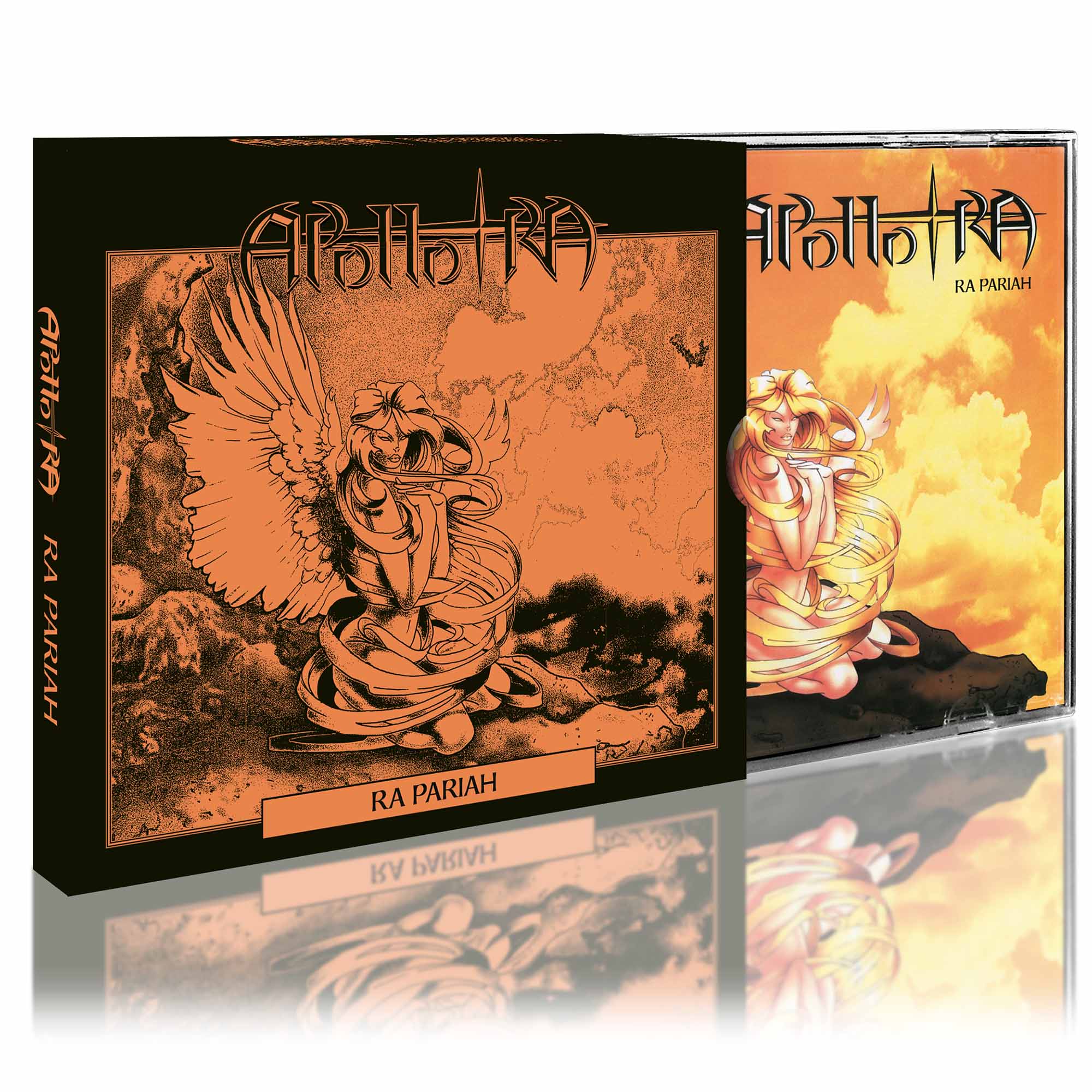 | ||||
| APOLLO RA - Ra Pariah DCD | |
HRR 862CD, slipcase, 2-sided poster | |
| Daniel John Miller - Lead Vocals Stephen Albinak - Drums Todd Channing Weaver - Bass & Vocals Kevin Bulkley - Guitars & Vocals Bill McKeowon - Guitars & Vocals | |
| CD1: 01 Crimson Streets 02 Out of the Night 03 Heaven's Just Another Way 04 Obsession (The Liars Dream) 05 The Challenge 06 Creating Zero 07 Ra Pariah 08 Bane of the Black Sword 09 Coming Of Age / Rukkus 10 March of Fire 11 To Be a Hero 12 Winds of Time (Demo 1989) 13 Alone in Darkness (Demo 1989) 14 Y.S.C. (Rehearsal) | CD2: Unreleased Album 1994 01 Floating 02 Y.S.C. 03 Earth 04 Green Electra Divine 05 War Song 06 Forever (The Promise) 07 The Hunger 08 Mission of Redeeming Qualities 09 Waterfall 10 Smoke Signals 11 Diablo Milk 12 Mindwheel 13 Vertigo 14 Post-Heroic 15 Floating (Slight Return) 16 Floating (Rehearsal) 17 Green Electra Divine (Rehearsal) 18 Earth (Rehearsal) |
AVAILABLE | |
mastered & restored by Patrick W. Engel at Temple of Disharmony
By the end of the 1980s the big success stories in heavy metal had all been written and it was getting more and more difficult for young bands to reach a wider public and secure the all elusive record deal. Especially in North America. A fine example for this development are Apollo Ra from Baltimore in Maryland, a band with enormous potential and lots of promise.
The band was put together in 1986 by lead singer Daniel John Miller and drummer Steve Albinak. Fed up with the usual struggling cover band scene, the two musicians decided to forge ahead with their own original songs. The two soon met up with bass player Todd Channing Weaver. Bill McKeowon and Kevin Buckley, both on guitar, completed the line-up.
Apollo Ra derived their name from two ancient sun gods: Apollo, the Roman god, who was extremely powerful, and Ra, the Egyptian deity, fierce and revered.
“I usually write songs about things I feel strongly about, or things that I just think are great,” remarked singer Daniel John Miller in 1989, when the »Ra Pariah« album was originally issued (as a private pressing on cassette only). “The song ‘Bane Of The Black Sword’ was inspired by a fantasy book I loved by Michael Moorcock, about a character called Elric. ‘March Of Fire’ was written about the period after the Civil War, when the North burned the South. It’s not necessarily just about that, but I used the event to symbolize the whole idea of how useless war is. And ‘Crimson Streets’ was written because I was totally fed up with people doing cocaine everywhere I looked. It’s not meant to be a judgemental song though ... I don’t want to preach through my music. Instead it’s meant to get across my opinion of the self-destruction and depression that it causes. I hope people will see it that way.”
Trying to describe Apollo Ra’s own sound drummer Stephen Albinak added: “We pair up a relatively straight-forward metal sound with intelligent lyrics, without trying to be really complex or complicated. Everyone in the band has really great technique, but we don’t write songs just to show off technique – we write to have a great song. That’s not always the same thing.” It’s definitely not. And so singer Daniel John Miller offered in support: “A lo of people write by copying other people. We don’t. We deliberately work on having our own unique sound. It’s powerful, but at the same time it has a message. Basically everybody in the band has a different background and different influences, so when you combine these elements, our sound becomes very individual.”
Stephen Albinak summed up the strengths of Apollo Ra like this: “I think the vocals really stand out. You can play ripping leads or really awesome drums, but most people seem to lock into the vocals. Danny’s got a good range, but he doesn’t over-use it. He knows when it’s the right time to scream, or to keep his voice low, and he’s really good at expressing himself vocally. I think we have good guitar work too. Bill and Kevin both play lead and rhythm guitar, and they are a great team. Also, Todd and I form a very tight rhythm section, and play well together.”
Despite Apollo Ra’s enormous potential, they were never able to sign a proper record deal. Carl Canedy, legendary drummer with The Rods, who produced the elven songs on »Ra Pariah«, takes over the story: “I signed the band to my production company and carried on with the album. We had strong interest from Metal Blade (one of my regrets in the music business) and Roadrunner US. Unfortunately we never finalized a deal for the band.”
As a result the »Ra Pariah« album was only issued as a cassette on Neon City Productions in a strictly limited edition in 1989 (with Ida S. Langsam from New York handling PR through her Metal I’s company). Carl Canedy explains: “It was definitely a full album production. We did extensive pre-production for this album prior to heading to the recording studio. Everyone was blow away by the band and the album. Apollo Ra were certainly ahead of their time and never gained the success they deserved. Having said that, had we been released on a solid metal label, it might be a different story.”
The songs on »Ra Pariah« had kind of an Egyptian theme (at least in parts), which was pretty original for the year 1989. This concept had huge potential and it’s a shame Apollo Ra were never able to develop it any further … Carl Canedy concludes: “I would agree! The band was never able to mine that line of writing. They were discouraged, as would any band, at not being picked up by a label.”
After »Ra Pariah«, however, Apollo Ra continued to struggle on. There were a few line-up changes though, as Carl Canedy explains: “Elaine Rudolph and I were managing the band at the time. Elaine moved on and I took over. I did continue shopping the band, however, once it’s a no from a couple of labels, there was really nowhere to go back then.”
Whilst no label interest was forthcoming, Apollo Ra also suffered a few line-up changes: “Andrew ‘Duck’ MacDonald was brought in for guitar for the album. The original guitarist left during pre-production. Once the album was completed, Kevin Buckley was brought in for live gigs and two additional studio recordings.”
Post-album songs like “Post-Heroic” or “Diablo Milk” were a bit more accessible than the bulk of the material on »Ra Pariah«, and a bit more modern-sounding as well. “We were inexperienced at recording when we did the first album,” comments Carl Canedy, who was heavily involved in managing, engineering and producing Apollo Ra. Canedy almost felt like an additional band member: “We were all aware of our individual sounds and tones prior to going into the studio. All of that makes a huge difference when heading into your second album.”
In the end, however, the second album, recorded in 1994, never officially saw the light of day – until now. “We really loved the songs we’d written for this album,” continues The Rods’ drummer, who also had a hand in arranging some of the material. “The recording went smoothly, as had the first. I worked with the band on songs and arrangements while Pat Kenyon, the engineer, focused on capturing the sounds. This album was much more relaxed and we enjoyed the process a bit more this time around. The band was much tighter this time around. The material was recorded over three sessions. The songs were done in a professional studio with the same production team as the others.”
“We all loved the name »Post Hypnotic Suggestion Box« as a possible album title,” remembers Carl Canedy today. “The band was hoping for a fresh start after having been rejected by the labels. I believe we would have continued in the style of the first album, had we been signed. We were a bit touchy now and decided to modify our style somewhat. In reality, once you have a style, it’s truly difficult to stray to far.”
MATTHIAS MADER
